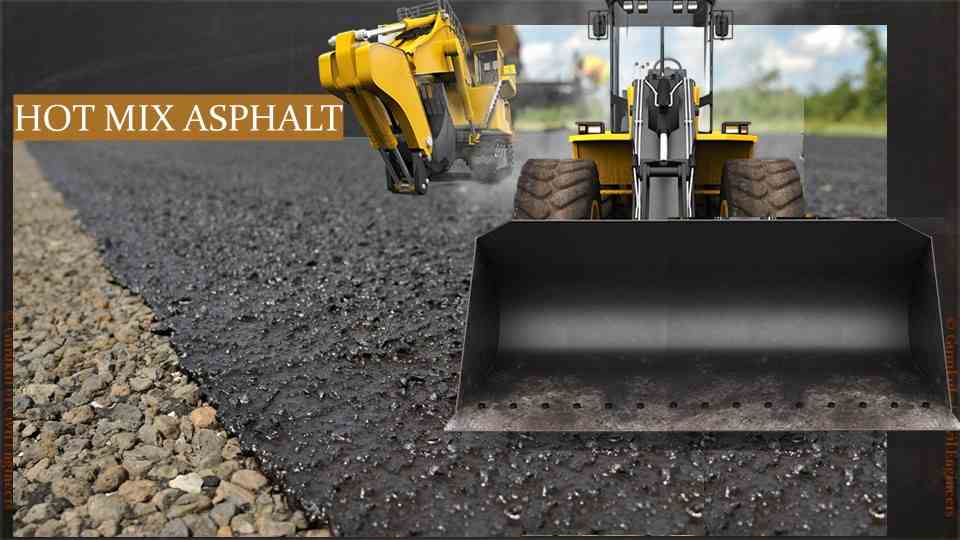Warm Mix Asphalt: Redefining Road Building And Construction Standards
Hot Mix Asphalt (HMA) is significantly altering the landscape of road construction techniques, establishing brand-new performance criteria and improving market criteria. Hot Mix Asphalt. This cutting-edge product's capability to enhance road longevity, hold up against heavy lots, and lower upkeep expenses has actually garnered focus from experts worldwide. Its influence on framework development and environmental sustainability has actually prompted a shift in the direction of its widespread adoption in building and construction tasks. The effects of HMA in redefining roadway construction standards are profound, providing an engaging case for a more detailed assessment of its transformative abilities in modern engineering methods.
Benefits of Warm Mix Asphalt
Hot Mix Asphalt (HMA) uses countless benefits that make it the recommended option for leading roadways. One of the vital advantages of HMA is its capacity to withstand hefty website traffic loads and severe weather condition conditions, guaranteeing durable performance.
Furthermore, the smooth surface coating of HMA lowers rolling resistance, boosting gas efficiency for automobiles and decreasing general transport expenses. The fast building and construction time linked with HMA tasks additionally boosts its cost-effectiveness by reducing labor and website traffic disturbance expenditures - Hot Mix Asphalt. The recyclability of HMA products makes it an eco sustainable option for road building tasks.
Long Life and Resilience of HMA
With a tried and tested track document of enduring hefty traffic loads and severe climate conditions, Hot Mix Asphalt (HMA) attracts attention for its outstanding long life and sturdiness in road building tasks. HMA's capacity to withstand the tensions imposed by high volumes of lorries, including hefty vehicles, makes it a top choice for freeways, interstates, and other heavily trafficked roadways. The toughness of HMA is further improved by its resistance to breaking and rutting, common problems that can considerably shorten the life-span of roads. By supplying a secure and smooth riding surface area for vehicle drivers, HMA reduces damage on cars and boosts overall road safety.

Environmental Benefits of HMA
Progressively, road building projects are turning to Hot Mix Asphalt (HMA) for its this content considerable environmental advantages. HMA is a lasting paving product that supplies several Full Report advantages in terms of environmental influence.
Additionally, HMA pavements are understood for their ability to minimize stormwater runoff. The smooth surface of HMA roadways allows rain to flow efficiently right into the ground, minimizing erosion and lessening the threat of flooding. This can have a favorable influence on the surrounding communities by preserving natural water flow patterns and protecting the quality of water bodies.
HMA in Road Building Projects

Road building and construction jobs profit from HMA's fast building time, permitting for faster completion of roads and reducing web traffic interruptions. Overall, integrating HMA into road building and construction projects leads to resilient, cost-effective, and green roads that meet the needs of modern transportation systems.
Impact of HMA on Facilities
The extensive use of Warm Mix Asphalt (HMA) in roadway construction jobs considerably influences the total infrastructure high quality and durability. Hot Mix Asphalt. HMA offers a long lasting and smooth driving surface that improves road safety by reducing and minimizing mishaps lorry wear and tear.
Moreover, making use of HMA in framework jobs adds to environmental sustainability. HMA is a recyclable product, which implies that old asphalt can be reused in new road building and construction, decreasing the click for source demand for virgin materials and lessening waste. This not only saves natural sources however also reduces the carbon footprint related to road building. To conclude, the impact of HMA on facilities is extensive, promoting more secure roads, cost-effectiveness, and ecological duty in road construction tasks.
Conclusion
In conclusion, Hot Mix Asphalt (HMA) has shown to be a game-changer in road building requirements because of its unequaled effectiveness, resilience, and cost-effectiveness. With its capability to endure hefty web traffic tons and harsh weather problems, HMA offers a resilient and trusted service for infrastructure tasks. Its smooth riding surface, resistance to fracturing, and ease of upkeep make it a leading option for improving road safety and security and reducing ecological impact. HMA establishes a brand-new criteria for high-quality and sustainable framework advancement.
With a tried and tested track document of standing up to heavy web traffic lots and harsh weather conditions, Warm Mix Asphalt (HMA) stands out for its outstanding long life and sturdiness in road building and construction jobs.Utilizing Hot Mix Asphalt (HMA) in road building projects uses countless benefits in terms of toughness and sustainability.Road building tasks profit from HMA's quick building and construction time, permitting for faster completion of roadways and lessening website traffic disruptions.The comprehensive usage of Warm Mix Asphalt (HMA) in roadway building tasks significantly influences the total infrastructure quality and durability. In verdict, the influence of HMA on facilities is extensive, advertising safer roads, cost-effectiveness, and ecological duty in road building projects.